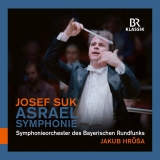 Josef Suk: Symphonie Nr. 2, Asrael; Symphonie-Orchester des Bayerischen Rundfunks, Jakub Hrusa; 2 CDs BR Klassik 900188; Liveaufnahme 10/2018, Veröffentlichung 28/02/2020 (62'43) - Rezension von Remy Franck
Josef Suk: Symphonie Nr. 2, Asrael; Symphonie-Orchester des Bayerischen Rundfunks, Jakub Hrusa; 2 CDs BR Klassik 900188; Liveaufnahme 10/2018, Veröffentlichung 28/02/2020 (62'43) - Rezension von Remy Franck
Die 2. Symphonie des Tschechen Josef Suk (1874-1935), Asrael, so benannt nach dem Todesengel, ist eine Reaktion auf den Tod von Suks Schwiegervater Antonin Dvorak und dem seiner Frau, der Tochter Dvoraks. Geprägt von einem immer wieder auftauchenden Schicksalsmotiv hat das Werk etwas von einer Tondichtung in fünf Sätzen.
Jakub Hrusa nimmt sich Zeit für Asrael. Er braucht in allen Sätzen mehr davon als seine Kollegen Belohlavek, Ancerl oder Kubelik. Das erlaubt es ihm, die Symphonie so zu entwickeln und zu strukturieren, wie man es wohl selten gehört hat. Für die fast 63 Minuten bringt Hrusa einen guten Atem mit, und sein Umgang mit der musikalischen Spannung und deren Auf- bez. Abbau ist meisterhaft. Ich glaube nicht, dass ich diese Symphonie schon einmal in einer derart zwingenden Erzählung, so atmosphärisch, so aufgewühlt gehört habe, in einer so packenden und völlig logisch-natürlichen, bruchlos fließenden Folge von hoch leidenschaftlichem und zutiefst poetischem Musizieren.
Hrusas Asrael ist ein über eine Stunde langer Albtraum aus Erinnerung, Trauer und Hoffnung. Das ist die rein interpretatorische Meisterleistung. Hinzu kommt das Orchesterspiel, das in diesem ganzen emotionalen Brodeln ungemein kultiviert klingt und auch im leidenschaftlichsten Fortissimo noch klangschön und flexibel.
Josef Suk’s Second Symphony, Asrael, named after the angel of death, is a reaction to the death of Suk’s father-in-law Antonin Dvorak and of his wife, Dvorak’s daughter. Characterized by a recurring motif of fate, the work has something of a tone poem in five movements.
Jakub Hrusa needs more time in all movements than his colleagues Belohlavek, Ancerl or Kubelik. This allows him to develop and structure the symphony in a way that is probably rarely heard.
For almost 63 minutes, Hrusa has plenty of breath, and his handling of the musical tension is masterful. I don’t believe that I have ever heard this symphony before in such a compelling, narrative, atmospheric and agitated performance. The most astonishing is how Hrusa manages to bring the succession of highly passionate and deeply poetic passages in a completely logical and natural flow.
Hrusas Asrael is an hour-long nightmare of memories, sorrow and hope. This is the purely interpretative side of the performance. On the other side there is a polished orchestral playing, which even in the most passionate fortissimo still sounds beautiful and elegant.
Here is an interview with Jakub Hrusa.






















